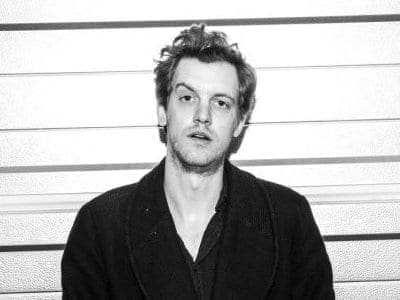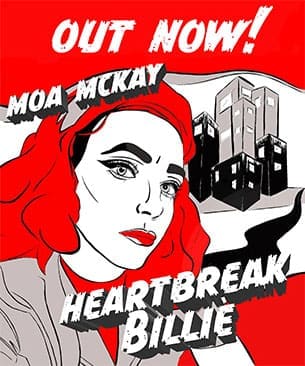We had the opportunity to speak with Maarten Devoldere, aka Warhaus, the frontman of Belgian band Balthazar. His first album We Fucked A Flame Into Being is out on September 2. Written and sung solely in English, it took the multi-instrumentalist six years to add the finishing touches to his solo project. “It was schizophrenic, because in those years I worked on the album, I had lived a bit everywhere”. Considering this record as a bit of a collage of periods and places, Devoldere, who took the name Warhaus from his grand father’s middle name, also mixes in a myriad of influences. From Leonard Cohen to Lou Reed, by way of African percussion.
Were you ever tempted to sing in Flemish?
No not really, the thing is, Dutch is a small language. If you sing in Dutch, you can sing and play in Flanders, half of Belgium and the Netherlands. It doesn’t make it very attractive. The thing is, where I’m from, on the seaside, we have a very strong accent. Which basically means that only a small part of Belgium can understand my Dutch. If I go to the Netherlands, they can’t even understand me. It’s not very melodic, it sounds a bit harsh.
Your album is called We fucked a Flame into Being. Apparently it’s from a book, could you tell me more about that?
It’s a line I read in a DH Lawrence book (Lady Chatterley’s Lover) when I was, I don’t know, fourteen or something. I remember reading that line and thinking: “What a cool line. Somebody should make a pop album that goes by that title”. And some ten years later, nobody had jumped on the opportunity and called an album that way, so I decided I was going to do it. I had the title long before I had the music.
I don’t know what I’m doing when I write, I put things together and if it sounds good…
I worked six years on this record, some songs were started six years ago and finished five years later. Other songs were recorded in a day. It was schizophrenic, because in those five years I had worked on the album, I lived a bit everywhere. So now when I listen to the record, I can say, this drum I recorded in Brussels. This guitar part was from Ghent. It’s all very much like a collage.
Alright. You describe it as a pop album, but is that the only genre you would put it in?
Yeah, I think so. It’s so wide as a term. It doesn’t say much, pop, so yeah. I make songs that are four minutes long and a lot of them have choruses and verses, so that’s pop.
They’ve got the structure of a Beatle album?
Yeah.
Who’s the lady singing with you and on the cover of the album?
Oh that’s Sylvie Kreusch, (in an attempt to pronounce it in a German way) Kreuch? Sounds pretty German. I think she has German family. She’s a singer from Belgium, she sings in a band called Soldier’s Heart and she’s a great performer. They were the support for Balthazar and I thought: “She can dance” and she could sing. So I asked her to come and sing some songs on the record. Her voice and mine match quite well. I like the fact that she sounds like a little girl when she sings.
Going back to the style in your album, a lot of people bring up Leonard Cohen and Gainsbourg. Are those two your main influences?
Leonard Cohen is definitely a big influence and Serge Gainsbourg as well I guess. But there are many others who don’t come out. I love Bob Dylan and Lou Reed, all those big guys. The thing I like about Gainsbourg is the production of his records, they are amazing. It sounds very fresh and at the same time it’s very classic and timeless.
Instrumentation, strings, bass. A lot of what made Gainsbourg’s albums iconic can be found on your album.
I don’t know what I’m doing when I write, I put things together and if it sounds good… I don’t know if you can call that composing.
You mentioned Lou Reed. Is he one of your influences on your last song on the album, “Time and Again”?
I guess so. You’re probably talking about the outro, which has a “Take a Walk on the Wild Side” vibe to it. The backing vocals and stuff. You never think about a certain song. People you listen to a lot, you find a way to incorporate them in your music. It’s the same with Leonard Cohen, lyrically there are so many references to him, to his books. You’ve got to use it to tell your own story.
Bruxelles sounds more feminine, Brussels sounds like “muscles”
Do you listen to reggae? I thought I heard hints of reggae in your album.
No, I’m not that much into reggae, but I’m very interested in African percussion. I like that voodoo kind of stuff.
On your album there’s a song entitled “Bruxelles”, written the French way, how come?
Because it sounds more feminine. Every song is about a girl I met and I didn’t want to call it after her, so I named it after the city where we met. Bruxelles sounds more feminine, Brussels sounds like “muscles”.
Is there a link between “Against the Rich” and the book you took the album title from?
No it’s about myself. It’s about earning money with music and you live by some holy rules and all of a sudden you find yourself playing a band and running a company. It’s so weird, the tension between those two things. Keeping your art pure and honest and at the same time, you’re aware that you’re selling a product.
Has it allowed you to come to grips with the situation?
Yeah I love it. I think all the showbiz thing after you finish the song… The whole circus starts and I kind of like it. I find it funny, I like to look at it with a smile on my face rather than hate it and be frustrated.
And what have you been doing since finishing the recording sessions?
I’ve been playing in the UK, doing a lot of festivals with Balthazar. I’ve already released three songs, made videos, interviews. I keep busy, writing new songs for Balthazar and Warhaus.
Warhaus will be playing at the Postbahnhof Club on October 19.
Interview by Patrick Bird


